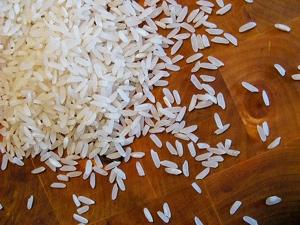Genetically engineered Golden Rice
(Image: bengarland/Flickr)
Golden Rice was developed about 20 years ago. Orange in color, it was genetically engineered to be rich in beta carotene, a nutrient our body converts into Vitamin A. Scientists hoped Golden Rice would save lives and the eyesight of a quarter of a billion kids worldwide not getting enough vitamin A in their diets, children who typically live in less developed countries where ordinary rice is a dietary staple.
The creators of Golden Rice planned to offer it to farmers for free. But now, nearly two decades later, the bio-engineered rice is still not available. "Living on Earth’s" Julie Grant traveled to India to find out why.
Just a few minutes drive outside the southern Indian city of Madurai, the crowded streets of food vendors, auto rickshaws, and cars give way to small villages and green countryside. People here do most of their farm work by hand. 77-year-old Dr. Lakshmi Rahmathullah has been working with people in these villages for most of her career. She examined children gathered in Arasakulam village. One ten-year-old girl said she couldn’t see at night. Her symptoms, if left untreated, can lead to much worse problems. Her cornea could have literally shriveled away, leaving her totally blind.
But the kids here were lucky. They got high dose Vitamin A supplements. The ten-year-old girl got her eyesight back within four months. International aid organizations estimate that fully a third of children under age five in India and Southeast Asia have some level of vitamin A deficiency. About two-thirds of Indian children under age five get Vitamin A supplements.
But there’s debate in India over the need to continue the supplementation program. Dr. H.P.S. Sachdev is former president of the Indian Academy of Pediatrics. He says most children these days don’t need the mega doses and many Indian families have gained the education and financial means to meet their vitamin A needs the way people in richer countries do – through those orange vegetables and leafy greens. So children should only get the mega doses if there’s an obvious lack of Vitamin A in their diet. There’s another way to meet low level needs – golden rice. Sachdev says children could just eat a little rice regularly.
Ten years ago, Dr. S.R. Rao, director of India’s Department of Biotechnology, was touring laboratories in Switzerland, and met geneticist Ingo Potrykus who was experimenting to make rice express beta-carotene. Rao says he wanted that rice for India, because he thought it could go a long way to reduce Vitamin A deficiency in regions where rice is a staple in the diet. Dr. Rao is a leader in efforts to transfer the genes for Golden Rice into varieties Indians already eat.
Thanks to a deal struck between Ingo Potrykus and the seed company, Zeneca, the government plans to give Golden Rice seeds free to farmers making under $10,000 a year. Zeneca, which is now part of Syngenta, owns many of the patents involved in making Golden Rice. In exchange for selling Golden Rice to the U.S. and European health food markets, the company agreed to give seeds away free to developing nations.
But those free seeds are making some people angry. Vandana Shiva is famous worldwide for her opposition to genetically modified foods and the companies that pervade GM seeds. Shiva says farmers have been growing cotton and rice for the commodities market instead of food for their families. She says they need to be reeducated to grow and eat those leafy greens and other vegetables rich in Vitamin A.
Dr. MS Swaminathan is largely credited for bringing modern farming to India in the 1960s, and for leading efforts to bringing genetically modified crops here today. If Syngenta is serious about giving away Golden Rice for free, Swaminathan says it should drop its patents. Syngenta says poor farmers in India will never have to pay for Golden Rice, but the company may want to use the technology elsewhere. So it’s holding on to its patents.
There are also questions about how much it will cost to complete development, to distribute seeds, to ensure children actually eat it, and that it provides enough Vitamin A.
Back in Araskulam Village in southern India, Dr. Lakshmi Rahmathullah wouldn’t mind seeing Golden Rice on these small farms, but she says for the sake of its children, it’s too soon for the Indian government to stop offering Vitamin A supplements. Dr. Lakshmi says the most important thing to offer malnourished families is food they can afford.
The story on Golden Rice comes to “Living on Earth” courtesy of SoundVision Productions in Berkeley, CA. And this update: The Rockefeller Foundation has announced it will provide funds to help Golden Rice pass through the regulatory process in India, Bangladesh, Indonesia, and the Philippines.
Hosted by Steve Curwood, "Living on Earth" is an award-winning environmental news program that delves into the leading issues affecting the world we inhabit. More "Living on Earth.
